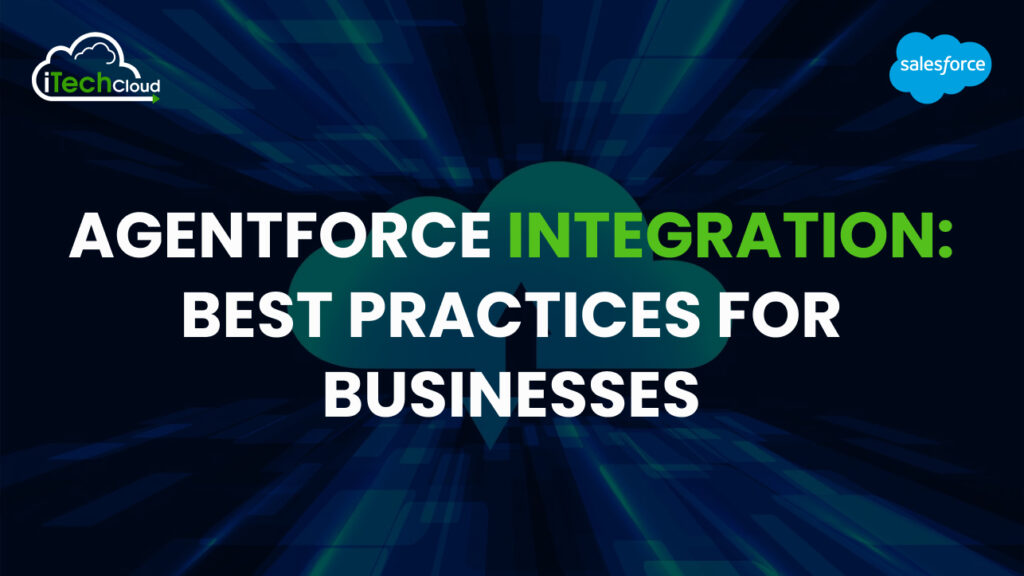Agentforce Integration: Best Practices for Businesses

Agentforce integration can be a game-changer for businesses looking to optimize their customer relationship management (CRM) and streamline workflows. Agentforce capabilities allows organizations to enhance sales productivity, improve customer service, and drive efficiency. However, successful integration requires strategic planning, proper execution, and ongoing optimization.
Table of Contents
Here are the best practices to help businesses make the most out of their Agentforce integration.
1. Understand Your Business Needs
Before diving into integration, it’s crucial to identify your specific business requirements. Outline your objectives, such as improving lead tracking, automating repetitive tasks, or gaining better insights into customer data. Understanding your needs ensures you implement the right features and avoid unnecessary complexity.
- Assess Current Processes: Analyze your existing workflows to determine gaps and inefficiencies.
- Define Clear Goals: Set measurable goals like reducing response times, increasing sales closure rates, or boosting team collaboration.
- Engage Stakeholders: Involve team members from different departments to gather diverse perspectives and ensure alignment with overall business objectives.
2. Choose the Right Integration Tools
Agentforce supports various tools and APIs for seamless integration with other platforms. Choosing the right tools depends on your tech stack and operational requirements.
- Evaluate Compatibility: Ensure Agentforce is compatible with your existing CRM, marketing automation tools, and other software.
- Use Pre-Built Integrations: Leverage pre-built connectors and plugins to save time and reduce the risk of errors.
- Consider Customization: For unique business needs, consider working with developers to build custom integrations using Agentforce’s APIs.
3. Prepare Your Data
Data quality plays a significant role in the success of any CRM integration. Before implementing Agentforce, ensure your data is clean, accurate, and up-to-date.
- Data Cleaning: Remove duplicate, outdated, or irrelevant records.
- Standardize Formats: Use consistent formats for fields like names, phone numbers, and addresses.
- Map Data Fields: Align data fields between Agentforce and other integrated systems to avoid mismatches.
4. Plan and Test the Integration
A well-structured plan is essential to ensure a smooth integration process. Testing the integration in a controlled environment helps identify potential issues before full deployment.
- Create a Roadmap: Break down the integration process into phases with clear timelines and milestones.
- Set Up a Sandbox Environment: Use a testing environment to simulate the integration and identify bugs or conflicts.
- Document Processes: Maintain detailed documentation to streamline future updates or troubleshooting.
5. Train Your Team
Even the best integration will fail without user adoption. Providing comprehensive training ensures that employees understand how to use Agentforce effectively.
- Role-Based Training: Tailor training sessions to different roles, focusing on relevant features for each team.
- Create Tutorials: Develop easy-to-follow guides and videos for reference.
- Provide Ongoing Support: Offer regular workshops and a helpdesk for continuous learning and troubleshooting.
6. Monitor Performance and Gather Feedback
After implementation, continuous monitoring and feedback collection are critical for optimizing the integration.
- Track Key Metrics: Measure the impact of Agentforce on KPIs such as sales growth, customer retention, and task completion rates.
- Solicit User Feedback: Regularly ask employees for feedback on system usability and areas for improvement.
- Refine Workflows: Use insights to adjust workflows, eliminate bottlenecks, and enhance efficiency.
7. Data Security and Compliance
Data security is a top priority when integrating any CRM system. Agentforce’s robust security features must be complemented with best practices to safeguard sensitive information.
- Set Permissions: Use role-based access controls to limit data visibility to authorized personnel.
- Enable Encryption: Ensure data is encrypted both in transit and at rest.
- Stay Compliant: Adhere to data protection regulations like GDPR, CCPA, or industry-specific standards.
8. Automation Features
One of the key benefits of Agentforce is its ability to automate repetitive tasks, freeing up time for more strategic activities.
- Automate Lead Assignments: Use rules to assign leads to the right sales representatives based on criteria like geography or expertise.
- Set Up Notifications: Configure alerts for important activities, such as deal closings or customer inquiries.
- Streamline Communication: Automate follow-up emails, reminders, and updates to maintain consistent engagement.
9. Integrate Analytics for Better Insights
Agentforce’s analytics tools provide valuable insights into customer behavior and team performance. Integrating analytics with your broader data ecosystem amplifies its impact.
- Custom Dashboards: Create dashboards that visualize key metrics tailored to your business goals.
- Integrate BI Tools: Connect Agentforce with business intelligence platforms for deeper analysis.
- Monitor Trends: Use predictive analytics to identify emerging opportunities or risks.
10. Plan for Scalability
As your business grows, your CRM needs will evolve. Ensure your Agentforce integration is scalable to accommodate future changes.
- Flexible Architecture: Choose integration solutions that support scaling without major disruptions.
- Add New Features Gradually: Introduce additional functionalities in phases to minimize complexity.
- Review Regularly: Periodically assess the integration to ensure it aligns with your growing needs.
11. Collaborate with Experts
Partnering with experts can significantly enhance the success of your Agentforce integration.
- Engage Consultants: Work with CRM specialists who understand your industry’s unique challenges.
- Leverage Vendor Support: Utilize Agentforce’s customer support and training resources.
- Network with Peers: Join user groups or forums to share experiences and learn from other businesses.
Conclusion: Agentforce Integration
Agentforce integration offers immense potential for businesses to improve efficiency, enhance customer relationships, and drive growth. By following these best practices from understanding your needs and choosing the right tools to training your team and leveraging automation you can ensure a seamless and impactful integration. With ongoing monitoring, optimization, and scalability planning, Agentforce can become a cornerstone of your business’s success.

